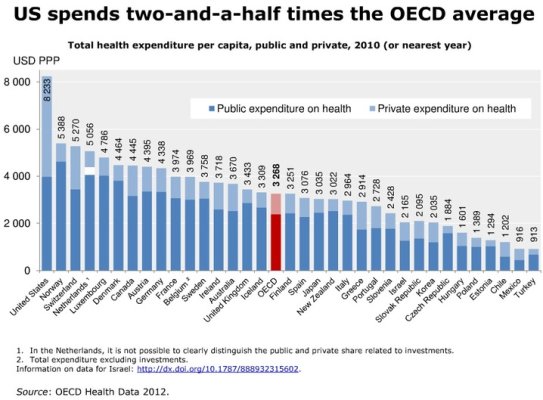This is asked as a hypothetical question, fully realizing that it will not happen in our lifetime, but:
Do you think you would approve of a Universal Health Program similar to the ones currently in effect in:
The Soviet Union, New Zealand, United Kingdom, Sweden, Iceland, Norway, Denmark, Finland, Japan, Canada, Australia, Italy, Portugal, Greece, Spain, South Korea, Taiwan, Israel Austria, Belgium, France, Germany, Luxembourg The Netherlands and Switzerland.
Plusses? Minuses? Good or Bad?
If this is seen as a political question, ok to delete, but there is a lot of experience here in ER with some of the different programs, and the good and bad.
For instance, I hear a lot about Canada and a long waiting list to see a doctor, but I have relatives there, who find the wait times for procedures, the same as, or even shorter than those in the US. My BIL is quite satisfied with what we might call "triage'... as procedures are scheduled. YMMV. Would like to hear about specific situations.
Also, it would be interesting to hear about situations where Americans visiting foreign countries are treated in the Universal Health Care systems.
Funding sources vary in the different countries.
Thoughts on physician and hospital charges, and accordingly the incomes of same.
Our system isn't going to change in the near future, but the difference between healthcare costs in the US will eventually be compared to those in the above listed countries.
If not a subject for discussion, certainly something to watch in the coming years.
Do you think you would approve of a Universal Health Program similar to the ones currently in effect in:
The Soviet Union, New Zealand, United Kingdom, Sweden, Iceland, Norway, Denmark, Finland, Japan, Canada, Australia, Italy, Portugal, Greece, Spain, South Korea, Taiwan, Israel Austria, Belgium, France, Germany, Luxembourg The Netherlands and Switzerland.
Plusses? Minuses? Good or Bad?
If this is seen as a political question, ok to delete, but there is a lot of experience here in ER with some of the different programs, and the good and bad.
For instance, I hear a lot about Canada and a long waiting list to see a doctor, but I have relatives there, who find the wait times for procedures, the same as, or even shorter than those in the US. My BIL is quite satisfied with what we might call "triage'... as procedures are scheduled. YMMV. Would like to hear about specific situations.
Also, it would be interesting to hear about situations where Americans visiting foreign countries are treated in the Universal Health Care systems.
Funding sources vary in the different countries.
Thoughts on physician and hospital charges, and accordingly the incomes of same.
Our system isn't going to change in the near future, but the difference between healthcare costs in the US will eventually be compared to those in the above listed countries.
If not a subject for discussion, certainly something to watch in the coming years.

